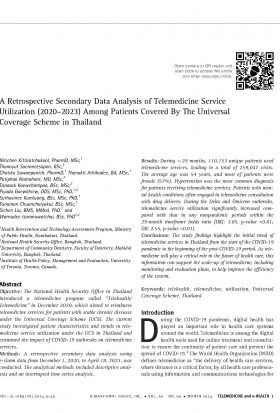This website uses cookies so that we can provide you with the best user experience possible. Cookie information is stored in your browser and performs functions such as recognising you when you return to our website and helping our team to understand which sections of the website you find most interesting and useful.
A Retrospective Secondary Data Analysis of Telemedicine Service Utilization (2020-2023) Among Patients Covered By The Universal Coverage Scheme in Thailand

Details
Abstract
Objective: The National Health Security Office in Thailand introduced a telemedicine program called “Telehealth/Telemedicine” in December 2020, which aimed to reimburse telemedicine services for patients with stable chronic diseases under the Universal Coverage Scheme (UCS). The current study investigated patient characteristics and trends in telemedicine service utilization under the UCS in Thailand and examined the impact of COVID-19 outbreaks on telemedicine services.
Methods: A retrospective secondary data analysis using e-claim data from December 1, 2020, to April 18, 2023, was conducted. The analytical methods included descriptive analysis and an interrupted time series analysis.
Results: During ~29 months, 110,153 unique patients used telemedicine services, leading to a total of 259,047 visits. The average age was 54 years, and most of patients were female (579o). Hypertension was the most common diagnosis for patients receiving telemedicine services. Patients with mental health conditions often engaged in telemedicine consultation with drug delivery. During the Delta and Omicron outbreaks, telemedicine service utilization significantly increased compared with that in any nonpandemic periods within the 29-month timeframe (odds ratio [OR]: 3.85, p-value <0.01; OR: 2.55, p-value <0.01).
Conclusions: The study findings highlight the initial trend of telemedicine services in Thailand from the start of the COVID-19 pandemic to the beginning of the post-COVID-19 period. As telemedicine will play a critical role in the future of health care, this information can support the scale-up of telemedicine, including monitoring and evaluation plans, to help improve the efficiency of the system.




